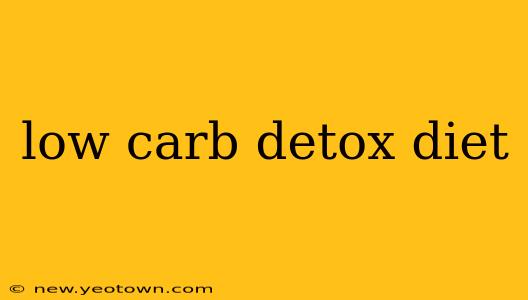Let's be honest, sometimes our bodies need a reset. We've all been there – feeling sluggish, bloated, and lacking that vibrant energy we crave. Enter the low-carb detox diet, a strategy that promises to help you shed excess water weight, boost your energy levels, and improve overall well-being by focusing on minimizing carbohydrate intake. But is it all it's cracked up to be? Let's dive in.
This isn't your typical crash diet; it's a mindful approach to nourishing your body while giving your digestive system a break. Think of it as a spring cleaning for your insides. Instead of focusing on restrictive calorie counting, this diet prioritizes nutrient-dense, low-carbohydrate foods that support your body's natural detoxification processes. But remember, this isn't a quick fix; it's a journey towards a healthier lifestyle.
What is a Low-Carb Detox Diet?
A low-carb detox diet emphasizes foods low in carbohydrates while prioritizing nutrient-rich options like leafy greens, healthy fats, and lean protein. The goal is to reduce inflammation, improve insulin sensitivity, and allow your body to efficiently eliminate toxins. By minimizing refined carbohydrates and sugars, you're essentially reducing the workload on your liver and kidneys, which are instrumental in detoxification.
The core principle is to limit your intake of foods high on the glycemic index (GI). These foods cause rapid spikes in blood sugar, potentially leading to inflammation and weight gain. By focusing on low-GI foods, you're promoting a more stable blood sugar level, preventing energy crashes and cravings.
What Foods Should I Eat on a Low-Carb Detox?
The beauty of a low-carb detox lies in its flexibility. While the specifics will depend on your individual needs and preferences, the foundation is built on:
- Leafy Greens: Spinach, kale, lettuce – these are packed with vitamins and minerals that support detoxification.
- Non-Starchy Vegetables: Broccoli, cauliflower, zucchini, peppers – these provide fiber and essential nutrients without significantly impacting blood sugar.
- Healthy Fats: Avocado, olive oil, nuts, and seeds – these are vital for hormone production and overall health.
- Lean Protein: Chicken breast, fish, eggs – crucial for satiety and muscle maintenance.
- Berries (in moderation): While technically containing carbohydrates, berries offer antioxidants and fiber.
What Foods Should I Avoid on a Low-Carb Detox?
To maximize the detoxifying effects, it's essential to limit or eliminate certain foods:
- Sugary Drinks: Sodas, juices, and sweetened beverages are major contributors to inflammation and weight gain.
- Processed Foods: These often contain unhealthy additives and preservatives that hinder detoxification.
- Refined Carbohydrates: White bread, pasta, pastries – these cause rapid blood sugar spikes and contribute to inflammation.
- Excessive Alcohol: Alcohol puts a strain on your liver, hindering its detoxification function.
How Long Should I Follow a Low-Carb Detox Diet?
The duration of a low-carb detox varies depending on individual goals and health conditions. Generally, a period of 7-14 days is a good starting point. However, it's crucial to consult a healthcare professional before starting any drastic dietary changes, especially if you have pre-existing health conditions. They can help you determine the appropriate duration and ensure the diet aligns with your specific health needs.
Is a Low-Carb Detox Diet Right for Me?
This diet isn't a one-size-fits-all solution. It's essential to consult your doctor or a registered dietitian before embarking on a low-carb detox, especially if you have underlying health conditions like diabetes or kidney disease. They can help you assess whether it's appropriate for you and tailor a plan to meet your specific needs.
What Are the Potential Benefits of a Low-Carb Detox Diet?
Many people report positive experiences with low-carb detox diets, including:
- Weight Loss: Reducing carbohydrate intake can lead to water weight loss and potentially fat loss.
- Increased Energy: Stabilizing blood sugar can lead to more consistent energy levels throughout the day.
- Improved Digestion: A reduction in processed foods can improve gut health.
- Reduced Inflammation: Lowering carbohydrate intake can help reduce inflammation in the body.
Important Note: These benefits are anecdotal and may vary from person to person. Consult a healthcare professional for personalized advice.
What Are the Potential Side Effects of a Low-Carb Detox Diet?
While generally safe for healthy individuals, some potential side effects of a low-carb detox include:
- Headaches: This is a common side effect of reducing carbohydrate intake, particularly in the initial stages.
- Fatigue: Some individuals may experience fatigue, especially if they are not getting enough electrolytes.
- Constipation: Insufficient fiber intake can lead to constipation.
Remember, a low-carb detox is a tool, not a magic bullet. Sustainable lifestyle changes are crucial for long-term well-being. Combining this diet with regular exercise and stress management techniques will yield the best results. Always consult your healthcare provider before starting any new diet.

